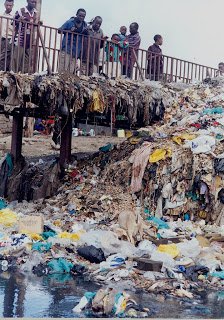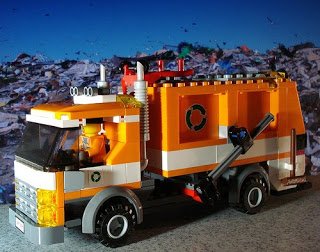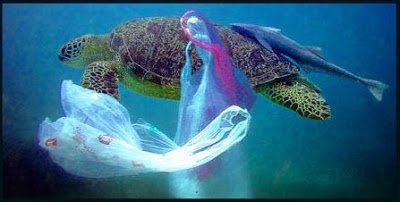The manufacture and use of plastics has contaminated the ocean to such a degree that in some places there is six times more plastic debris in the water than plankton. This is killing the fish and birds who can't help but consume it, and humans who eat seafood are getting their share of plastic as well. At this point, there are no technologies sufficient enough to clean it, especially if we don't stop contributing to it.
The video below started my quest for change several years ago. Until I saw it, I was oblivious to any complicity I might have in the sad state of human affairs. The problems were someone else's fault, and it was their responsibility to fix them. So long as I recycled, volunteered occasionally and didn't pour motor oil down my toilet, I was an exemplary world citizen deserving of praise and possibly awards.
I was completely delusional.
When I saw this video, I realized that the decisions we make in our daily lives can have profound consequences for the lives of others, even halfway across the planet. I realized that it is truly possible to sully our world so badly that we won't be able to live here anymore.
If you don't have time for a ten minute video, here's a shorter one with less information but more emotional impact. You can also read about the problem here.
While the outlook is on the gloomy side, we might have a chance of making it better if we at least stop making it worse. To do this, we need to dramatically reduce our production of plastics and stop making non-recyclable plastics altogether. Because a significant percentage of ocean-polluting plastics are pre-production plastics (pellets deposited in the ocean before being made into anything) recycling alone isn't enough.
Ideally, we also need to find bio-plastics that can replace the petroleum-based plastics we use now. We use nearly 12 billion gallons of oil and fuel equivalents every year just to make plastic bags.

On the bright side and so you don't feel like banging your head against a wall repeatedly, here are some innovative solutions people are developing to deal with the problem of plastics. Plastics can be biodegradable, can be made back into oil, and can be made out of non-toxic materials, even mushrooms. We don't have a solution for the plastic already in the ocean, but reading about the creativity of humans in trying to solve these problems makes me feel like eventually we may. At this point, there are some concepts and prototypes that look promising, but nothing that fully addresses the problem.
Here are steps I'm taking to help:
-- Stop thinking that "disposable" means "goes away." There isn't anywhere for it go. What I throw away today may end up on my dinner plate tomorrow.
-- Reduce my use of plastics as much as possible. Buy glass bottles instead of plastic, use canvas grocery bags, and and reject beauty products that contain microbeads. Avoid plastic packaging by choosing items without it, or buy things in bulk, which uses less.

-- Recycle any plastics I can't avoid using.
-- Clean up plastic litter when I see it in the street. A large percentage of plastic in the ocean comes from urban runoff.
-- Plastics from clothing fibers are a major contributor to the problem. Consider buying a washing machine filter to keep these particles from contaminating ground water. Contact washing machine manufacturers to ask that these filters become standard on their machines.
-- Buy used instead of new and share with friends and neighbors. This keeps old plastic items out of the landfill and the ocean. It also means there's one less product that needs to be manufactured.
-- Pressure the companies I buy from to switch to bio-plastics or other more environmentally friendly packaging. Write to them and let them know I'm not buying their products until the packaging changes.
-- Write to my congressman and ask that action be taken. Encourage bills that reduce the manufacture of plastic, encourage plastic recycling, support research into alternatives, and support the adoption of those alternatives.

-- Support organizations that are working to solve the problem. Ocean Conservancy, Algalita Marine Research Foundation, Ocean Alliance, Center for Ocean Solutions and Clean Seas Coalition.
-- Sign this petition
-- Spread the word. The more people who know about the problem, the more pressure there will be on industry to change.

ABSOLUTELY NOT! If you want to make the problem worse get the government involved. The government could screw up a wet dream. Look at the various 'wars' the government is involved in. They are government employment projects (they employee more government employees) and do NOTHING to address the problem. In fact if they did the job they were created to do they'd be out of work.
NO. no a thousand times no. Do NOT involve the government.
IF you want to do something constructive about it find a free market solution. If you could develop a USE for use for plastic bags and pay a 'bounty' for them then every redneck and homeless perseon would be collecting them to turn in for the money.
Oddly enough I've written a Science fiction book (https://www.amazon.com/dp/B01C0ND04M#nav-subnav) in which I address that very subject. You might find it interesting the way I've handled the situation.
Downvoting a post can decrease pending rewards and make it less visible. Common reasons:
Submit
You might know i live on a sailing boat for now 17 years !! You cannot imagine what i see and collect from my boat and dinghy while going into town for me coffee. This is a total mess and we are in big trouble if this terrible phenomena of plastic discarded to the oceans is not put in check !! Look up Bi Phenol A in plastics and its effect on living organisms of the rivers and oceans. Scary stuff indeed !! GREAT SUBJECT AND POST....UPVOTED !!
Downvoting a post can decrease pending rewards and make it less visible. Common reasons:
Submit